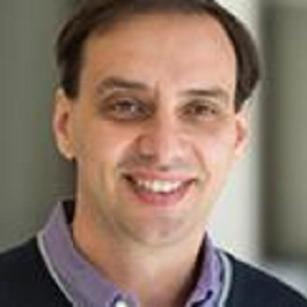
77 Massachusetts Ave.
Cambridge, MA 02139
Degrees
- PhD in Biophysics, Harvard University, 1998
- MSc in Chemistry, The Weizmann Institute of Science, 1994
- Diploma with Honors in Physics, The Moscow Engineering Physics Institute, 1992
Bio
Leonid Mirny received his PhD in Biophysics from Harvard University. After a few years as a Junior Fellow at Harvard Society of Fellows, he was appointed to the MIT Faculty in 2001, joining the MIT Health Sciences and Technology Division and the Department of Physics. Prof. Mirny teaches classes in Statistical Physics in Biology, Quantitative Genomics, and a freshman seminar in Quantitative Biology. He is working to understand the human genome in 3D with his team at MIT in collaboration with the Dekker Lab at UMass Medical School. Using new data uncovered via Chromosome Conformation Capture (Hi-C) technology and computer simulations, the collaborators explore how the genome is organized inside a cell.
In 2015, Mirny became a co-director of the new Center for 3D Structure and Physics of the Genome at UMass Medical School and MIT, funded by the National Institutes of Health’s 4D Nucleome Program. The program, initiated by Director of the NIH, Francis Collins, is a focused, interdisciplinary directive, funding more than 25 labs to map not only the 3D architecture of the human genome, but also how this organization changes over time—the fourth dimension.
Dr. Mirny’s research focuses on biological physics and system biology. His multi-disciplinary approach combines first-principle physics with the analysis of genomic data. His efforts in Biological Physics involve the development of novel computational tools and physical models of genome organization and dynamics. Read more in the Nature Highlight article
Prof. Mirny is a Fellow of the American Physical Society, an Associate Faculty of the Broad Institute, and an Associate Member of the Dana-Farber Cancer Institute.
Research
The Mirny lab combines quantitative, typically physics-rooted, approaches with analysis of genomics data to address fundamental problems in biology, most recently they focused on two problems: (i) higher-order chromatin structure; (2) evolution of cancer during neoplastic progression. Studies of the Mirny lab on chromosomes aim to characterize 3D architecture of the genome and processes that lead to its organization and reorganization in the cell cycle and development. Works of the Mirny lab on cancer aim at understanding the role of multiple “passenger” genetic events, such as individual mutations and chromosomal alterations, in cancer progression.
Selected Awards/Societies
- Fellow of the American Physical Society
- NEC Fund Award
- Samuel A. Goldblith Career Development Award
- Alfred Sloan Research Fellow
- John F. & Virginia B. Taplin Award
- William F. Milton Award
Selected Publications
- V. Imakaev, G. Fudenberg, N. Abdennur and L. A. Mirny. “Emerging Evidence of Chromosome Folding by Loop Extrusion.” Cold Spring Harb Symp Quant Biol. 2018 May 4.
- H. Gibcus, K. Samejima, A. Goloborodko, I. Samejima, N. Naumova, J. Nuebler, M. T. Kanemaki, L. Xie, J. R. Paulson, W. C. Earnshaw, L. A. Mirny, and J. Dekker.”A pathway for mitotic chromosome formation.” Science. 2018 Feb 9;359(6376).
- Schwarzer, N. Abdennur, A. Goloborodko, A. Pekowska, G. Fudenberg, Y. Loe-Mie, N. A. Fonseca, W. Huber, C. Haering, L. A. Mirny, and F. Spitz. “Two independent modes of chromatin organization revealed by cohesin removal.” Nature. 2017 Nov 2;551(7678):51-56.
- D. McFarland, J. A. Yaglom, J. W. Wojtkowiak, J. G. Scott, D. L. Morse, M. Y. Sherman, and L. A. Mirny. ” The Damaging Effect of Passenger Mutations on Cancer Progression.” Cancer Res. 2017 Sep 15;77(18):4763-4772.
Read more about Professor Mirny’s work here.
Courses Taught
Description
The Mirny lab combines quantitative, typically physics-rooted, approaches with analysis of genomics data to address fundamental problems in biology, most recently they focused on two problems: (1) higher-order chromatin structure; (2) evolution of cancer during neoplastic progression. Studies of the Mirny lab on chromosomes aim to characterize 3D architecture of the genome and processes that lead to its organization and reorganization in the cell cycle and development. Works of the Mirny lab on cancer aim at understanding the role of multiple “passenger” genetic events, such as individual mutations and chromosomal alterations, in cancer progression.
